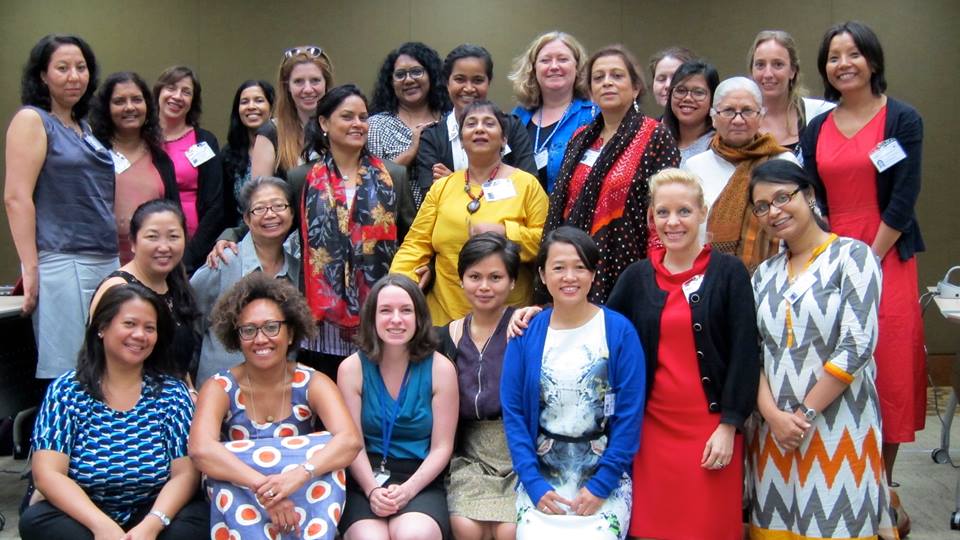Civil Society plan to Review 20 years of Beijing Platform for Action
A broad coalition of feminist and women’s rights networks, constituencies and allies are preparing for the United Nations Economic and Social Commission for Asia and the Pacific (UN ESCAP) regional and global review of the Beijing Declaration and Platform for Action.
A CSO Steering Committee of 16 organisations1 including regional networks, constituency based groups including Indigenous, migrant, women with disabilities, youth, LBT women, subregional representatives, and groups with specific expertise on women’s human rights including sexual and reproductive health and rights groups has formed to guide preparations.
The committee was created to ensure Asia Pacific civil society has an audible and influential role in reviewing progress and demanding genuine, accountable and binding processes to finally deliver on the promises made 20 years ago by governments.
 The committee will collaborate to facilitate a Civil Society Forum to be held in Bangkok on the 15th and 16th November, prior to the UN ESCAP Asian and Pacific Conference on Gender Equality and Women’s Empowerment: Beijing+20 Review. They will also provide substantive input to the regional and global stock-taking reports, liaise with UN Agencies, and ensure regional voices impact on the subsequent global processes of review.
The committee will collaborate to facilitate a Civil Society Forum to be held in Bangkok on the 15th and 16th November, prior to the UN ESCAP Asian and Pacific Conference on Gender Equality and Women’s Empowerment: Beijing+20 Review. They will also provide substantive input to the regional and global stock-taking reports, liaise with UN Agencies, and ensure regional voices impact on the subsequent global processes of review.
Civil society have stressed the need to focus on accountability and implementation of the Beijing Platform. The promises governments made 20 years ago have not been honored in a holistic and interconnected manner. In 2015, the UN will hold a Global Summit during the September General Assembly where governments are expected to identify priorities from the Beijing Platform for implementation and make specific commitments to act and to provide the financial and other means of implementation necessary.
In the UN ESCAP Committee on Social Development meeting held in Bangkok 18-20 August, civil society2 was able to make several interventions:
- CSO Opening Statement to ESCAP
- CSO statement on Inequalities at the 3rd session of the Commission on Social Development
- CSO Statement on Sexual and Reproductive Health and Rights; Gender Inequalities, Discrimination, and Violence; and Conflict
- CSO Statement on Civil Society Voice and Inclusion of Women with Disabilities
- CSO Statement on Accountability
- CSO Statement on Human Rights, Development and Peace
- CSO Closing Statement to ESCAP
While space at the regional level to engage in the processes has grown, civil society is deeply concerned about the deficiency of binding commitments and the backsliding on existing language on women’s human rights. The committee has been generously supported by UN Women and will continue collaboration with UN Women and UN ESCAP in the review processes.
For more information contact Reileen@apwld.org and claireapl.dawn@gmail.com
[1]Asia Indigenous Peoples Pact (AIPP); Asia Pacific Forum on Women, Law and Development (APWLD); Asian-Pacific Resource and Research Centre for Women (ARROW); Asia Pacific Women with Disability (APWWD) United; Asia Pacific Women Watch (APWW); Development Alternatives with Women for a New Era (DAWN); Diverse Voices and Action for Equality (DIVA); femLINKPACIFIC; Fiji Women’s Rights Movement; Global Alliance Against Traffic in Women (GAATW); Isis International; International Women’s Rights Action Watch (IWRAW) Asia Pacific; Pacific Youth Council; Women’s Alliance for Communities in Transition – South Asia (WACT-SA); Women’s Global Network for Reproductive Rights (WGNRR); Women Organizing for Change in Agriculture & Natural Resource Management (WOCAN)
[2]CSO Steering Committee with Asian Forum of Parliamentarians on Population and Development (AFPPD); Asia Pacific Alliance for Sexual and Reproductive Health and Rights (APA); Innovative Solutions; International Planned Parenthood Federation – South Asia (IPPF-SA); International Women’s Health Coalition (IWHC); National Alliance of Women (NAWO)
